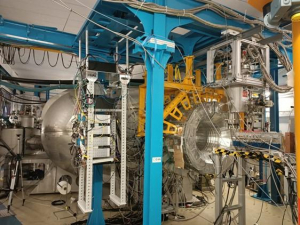A project from IFIC boosts CSIC's presence in major European R&D platforms
The project FAIR NUSTAR-DACQ Support and reinforcement for the integration of detection systems in NUSTAR, led by the Institute of Corpuscular Physics (IFIC), a joint center of the CSIC and the University of Valencia, is one of two CSIC projects in the Valencian Community awarded funding through the CSIC Programme for Major European Research Infrastructures (ESFRI) for 2025. These grants aim to strengthen the CSIC's position in European and international consortia and promote its participation in platforms included in the European Strategic Forum for Research Infrastructures (ESFRI).
In this call, launched by the Vice Presidency for International Relations (VRI), four grants have been awarded. Two of them go to joint CSIC–University of Valencia institutes: the Institute for Integrative Systems Biology (I2SysBio) and the Institute of Corpuscular Physics (IFIC), both located at the University’s Science Park (Parc Científic). Each research center will receive close to €100,000, distributed across three years (2025, 2026, and 2027).
NUSTAR (IFIC)
One of the projects to receive funding from the CSIC is FAIR NUSTAR-DACQ Support and reinforcement for the integration of detection systems in NUSTAR, an initiative coordinated by Enrique Nácher and Dolores Cortina (IP), both CSIC researchers at the Institute of Corpuscular Physics (IFIC, CSIC–UV).
FAIR (Facility for Antiproton and Ion Research in Europe) is an international facility located in Darmstadt, Germany, designed to explore the deepest secrets of matter. There, scientists from around the world use heavy ion and antiproton beams to recreate conditions similar to those in the cores of stars or in neutron star collisions. The goal is to understand how chemical elements are formed in the universe, how matter behaves under extreme conditions, and what laws govern the subatomic world.
FAIR is structured around four main experimental pillars, one of which is NUSTAR (Nuclear Structure, Astrophysics and Reactions), a scientific collaboration that brings together researchers studying exotic atomic nuclei—atoms with unusual configurations not found in nature. These studies are essential for understanding astrophysical phenomena such as supernovae or the formation of heavy elements like gold and uranium.
The newly approved project is led by IFIC and involves other CSIC centers such as the Institute of Structure of Matter (IEM) and the Institute of Space Sciences (ICE). Its main goal is to improve the data acquisition systems (DAQ) used in NUSTAR experiments.
These systems are essential for accurately recording the results of nuclear collisions taking place at FAIR. To this end, specialized technical staff will be hired and advanced electronic components will be acquired, enabling the integration of Spanish equipment with FAIR’s technological standards, such as the high-precision White Rabbit synchronization system. Beyond its scientific value, the project also includes a strong training and technological component, offering young technicians and researchers hands-on experience in cutting-edge instrumentation.
FAIR is included in the European roadmap for scientific infrastructures (ESFRI) and in the CSIC Strategic Plan, underscoring its strategic importance. Through this initiative, the CSIC strengthens its presence at the forefront of nuclear physics with a new project at FAIR, one of Europe's most ambitious scientific infrastructures.
More information about NUSTAR: Enlace.



















